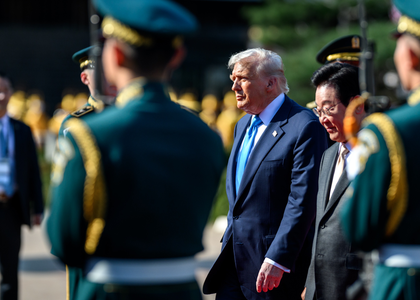Lee asks Trump to allow South Korea to have fuel for nuclear-powered submarines
By IANS | Updated: October 29, 2025 19:30 IST2025-10-29T19:29:13+5:302025-10-29T19:30:28+5:30
Gyeongju (South Korea), Oct 29 President Lee Jae Myung on Wednesday asked US President Donald Trump to allow ...

Lee asks Trump to allow South Korea to have fuel for nuclear-powered submarines
Gyeongju (South Korea), Oct 29 President Lee Jae Myung on Wednesday asked US President Donald Trump to allow South Korea to secure fuel for nuclear-powered submarines and vowed to increase defence spending to bolster the nation's military capabilities.
Lee made the remarks during their summit in the southeastern city of Gyeongju, as Seoul has been seeking to revise its bilateral nuclear energy agreement with Washington to gain greater flexibility in reprocessing spent nuclear fuel and enriching uranium.
"I hope you will make a decision to allow us to have supply for nuclear-powered submarines," Lee said, asking Trump to instruct his administration to advance consultations on spent nuclear fuel reprocessing.
It marks the first time that Lee publicly raised the need for South Korea to pursue nuclear-powered submarines, Yonhap news agency reported.
Lee said diesel-powered submarines have limited underwater navigation capabilities, restricting the South Korean military's ability to track North Korean or Chinese submarines. He emphasised that his request is not aimed at building nuclear-armed submarines.
"If fuel supply is permitted, we can build several submarines equipped with conventional weapons using our own technology to defend the waters around the Korean Peninsula, ultimately reducing the burden on US forces," he said.
Lee also asked Trump to instruct his administration to advance consultations on revising the bilateral nuclear pact on spent nuclear fuel reprocessing and uranium enrichment.
Currently, South Korea is allowed to enrich uranium below 20 per cent only with US consent and is prohibited from reprocessing spent nuclear fuel.
He also pledged efforts to upgrade the alliance into a "future-oriented comprehensive strategic alliance" through "modernization," saying his government will increase the defence budget as part of the efforts.
"The Republic of Korea will boost defence spending and develop the defence industry to significantly enhance its self-defence capabilities," Lee said, referring to the country's official name. "We will make sure to increase our defence expenditures to help reduce the US' defence burden."
Lee further reaffirmed Seoul's commitment to support Trump's initiatives to revive the US manufacturing industry through expanded investment and purchases in the US.
"We will actively strengthen cooperation in shipbuilding, which will not only benefit both of our economies but also contribute greatly to making the alliance more practical and robust," he said.
South Korea has proposed an initiative, the Make American Shipbuilding Great Again (MASGA) project, to help rebuild the US shipbuilding industry, as part of its US$350 billion investment pledge tied to a trade deal reached in July.
Their second summit, following their White House talks in August, was closely watched for signs of whether the two leaders could make a breakthrough in the ongoing trade negotiations. However, they did not directly address the tariff issue during their opening remarks, Yonhap news agency reported.
Earlier at the APEC CEO Summit, Trump said a trade deal with South Korea would be finalised "very soon," though officials on both sides have played down the likelihood of an agreement this week.
While speculation had flared over whether Trump would meet North Korean leader Kim Jong-un during his Asia trip, both leaders confirmed that such a meeting would not take place, with Trump saying, "We really weren't able to work out timing."
Lee said the anticipated meeting did not materialize because Kim has not "fully embraced the sincerity" of the U.S. president.
Nevertheless, he noted that Trump's expression of willingness to meet "at any time" has already brought a "sense of warmth and peace" to the Korean Peninsula.
"This will serve as another seed that can spark a major wave of peace on the Korean Peninsula," he said, adding that the government will continue to support Trump's peace efforts.
In the evening, Lee hosted a special dinner with Trump and leaders from seven nations, Vietnam, Australia, New Zealand, Canada, Thailand and Singapore, seeking to strengthen its role as a key US ally and as an "agenda setter" in regional cooperation, the presidential office said.
During the talks, the two leaders discussed a wide-ranging agenda, including economic ties, alliance modernization, peace on the Korean Peninsula, regional security issues and cooperation in the shipbuilding industry, National Security Advisor Wi Sung-lac said in a briefing.
Lee explained that South Korea imports most of its nuclear fuel from Russia and faces the urgent challenge of managing spent nuclear fuel from its reactors, according to Wi. Trump shared the need to explore broader opportunities in strategic areas based on South Korea's advanced nuclear capabilities, he said.
While the current bilateral nuclear pact only covers the "peaceful use of nuclear energy," Lee's request for US approval to secure fuel for nuclear-powered submarines -- which is considered for military purposes -- will require adjustments to the agreement in follow-up negotiations, Wi noted.
Lee reiterated his commitment to denuclearization on the Korean Peninsula through his three-stage roadmap of a stop, reduction and dismantlement of North Korea's nuclear program. Trump expressed concerns about the growing threat posed by North Korea's nuclear capabilities and vowed to provide necessary support to promote peace and stability on the peninsula, he said.
On shipbuilding cooperation, the two leaders agreed to launch a consultative body involving the National Security Councils of both countries.
Trump also expressed interest in inviting Lee to the White House, and Lee conveyed his appreciation for the invitation, saying he would visit at a mutually convenient time, Wi said.
Disclaimer: This post has been auto-published from an agency feed without any modifications to the text and has not been reviewed by an editor
Open in app